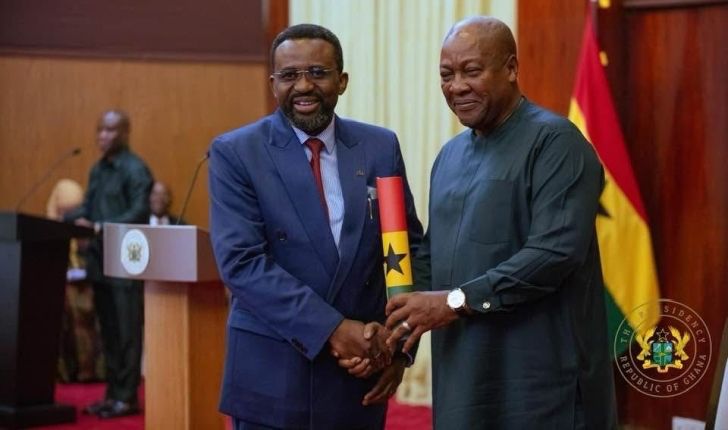Dr. Johnson Pandit Kwesi Asiama, the newly appointed Governor of the Bank of Ghana (BoG), has outlined a comprehensive six-point agenda to address the country’s economic challenges and steer it towards stability and growth. His vision centers on strengthening the financial system, promoting financial inclusion, and achieving exchange rate stability, all while navigating the complexities of a globalized economy and leveraging the potential of emerging technologies. Dr. Asiama’s priorities reflect a deep understanding of the interconnectedness of monetary policy, fiscal stability, and inclusive growth, emphasizing the need for a robust and adaptable central bank capable of responding to both domestic and international pressures.
A central pillar of Dr. Asiama’s plan revolves around stabilizing the Ghanaian cedi and curbing the rampant currency speculation that has plagued the economy. He envisions a well-functioning and stable foreign exchange market as crucial to supporting sustainable economic activity. To achieve this, the Governor intends to introduce a new foreign exchange law to replace the outdated 2006 Act, aiming to tighten regulations, plug forex leakages, and optimize the central bank’s management of its reserves. This legislative overhaul is expected to provide a more robust and transparent framework for foreign exchange transactions, enhancing market efficiency and reducing vulnerabilities to speculative attacks. Further bolstering the cedi, Dr. Asiama proposes leveraging Ghana’s gold reserves and strategic foreign assets, along with reforms to the Domestic Gold Purchase Programme. This approach aims to diversify the country’s foreign exchange holdings and create a more resilient buffer against external shocks.
Financial inclusion is another key priority for the new Governor, recognizing its potential to drive economic expansion and alleviate poverty. Dr. Asiama envisions Ghana as a regional hub for digital assets and financial technology, advocating for the implementation of a comprehensive digital strategy to keep pace with the evolving financial landscape. This strategy involves supporting initiatives that expand access to financial services, particularly in underserved communities, by leveraging fintech and mobile banking solutions. This focus on digital innovation aligns with global trends towards greater financial accessibility and aims to empower individuals and businesses through technology-driven financial services.
Dr. Asiama’s commitment to sound monetary policy is evident in his focus on managing inflation, a persistent challenge for the Ghanaian economy. He recognizes the importance of using appropriate monetary tools to control inflation and maintain price stability, a critical factor for sustained economic growth and investor confidence. This implies a commitment to data-driven decision-making and a proactive approach to managing inflationary pressures, utilizing interest rate adjustments and other monetary instruments to maintain a stable macroeconomic environment.
Strengthening the regulatory framework governing the financial sector is also a key element of Dr. Asiama’s agenda. He recognizes the need for a robust and effective regulatory environment to promote financial intermediation, ensuring the stability and soundness of financial institutions. This includes strengthening oversight mechanisms, enhancing transparency, and promoting responsible lending practices to safeguard the interests of depositors and investors. A strong regulatory framework will also foster greater confidence in the financial sector, encouraging investment and economic growth.
Another crucial aspect of Dr. Asiama’s strategy is improving coordination between fiscal and monetary policies. While acknowledging the importance of the Bank of Ghana’s independence, he emphasizes the need for a synergistic approach between the central bank and the government. Effective coordination between monetary and fiscal policies can lead to more consistent and impactful economic outcomes, ensuring that both policies work in tandem towards shared economic goals. This coordinated approach will be essential in addressing the country’s fiscal challenges, including high budget deficits and growing debt levels. Furthermore, addressing the central bank’s negative equity position is crucial for restoring financial stability and ensuring the BoG’s long-term sustainability.
In summary, Dr. Asiama’s comprehensive six-point plan offers a roadmap for Ghana’s economic recovery and future growth, prioritizing exchange rate stability, financial inclusion, and prudent monetary and fiscal policies. His vision for a digitally driven and inclusive financial system, coupled with a commitment to sound macroeconomic management and robust regulation, signals a proactive and forward-looking approach to navigating the complexities of the modern global economy. The success of these initiatives will depend on effective implementation, consistent policy execution, and a commitment to transparency and accountability. The Governor’s emphasis on strengthening the central bank’s position and fostering collaboration with other stakeholders will be crucial for building a more resilient and prosperous Ghanaian economy.


